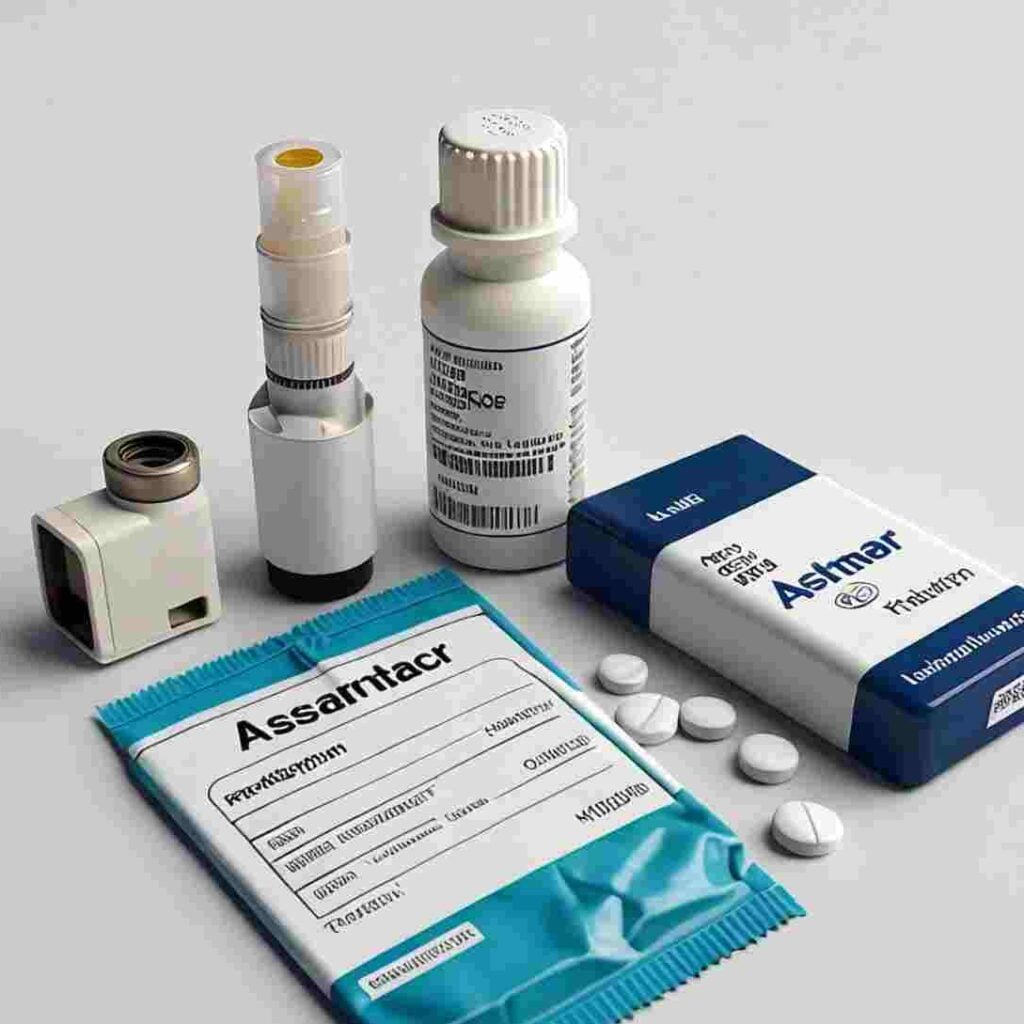Asthma is a chronic respiratory condition characterized by recurring episodes of wheezing, coughing, chest tightness, and shortness of breath.
One of the most common symptoms of asthma is asthma cough, a persistent and irritating cough that can disrupt daily life.
In this article, we will explore the best OTC asthma tablets and medicines for asthma cough, providing individuals with the knowledge to make informed decisions and manage their symptoms effectively.
Recommended Readings:
- Ovarian Cyst Treatment | Antibiotics For Ovarian Cyst
- Bacterial Infection In Anus Treatment | Fistula Treatment
- Best Antibiotics For Acne And Pimples
- Over The Counter Antibiotics For Tooth Infection
- Best Antibiotic For Breast Infection | Breast Infection Treatment
- Antibiotics For Stomach Infection | Antibiotics For Gastroenteritis
- Best Antibiotics For Vaginal Infection | Vaginal Itching
- Antibiotics For UTI | Antibiotics For UTI In Men+Women
Best Over-The-Counter Cough Medicine For Asthmatics

Table Of Contents
Understanding Asthma And Asthma Cough
Understanding the causes, triggers, and symptoms of asthma cough is crucial for effective management and treatment. By recognizing the impact of asthma cough on daily life, individuals can take steps to control their symptoms and improve their overall well-being.

What is Asthma?
Asthma is a chronic inflammatory disease of the airways, characterized by recurring episodes of wheezing, coughing, chest tightness, and shortness of breath. It occurs when the airways in the lungs become inflamed and constricted, making it difficult to breathe.
Causes of Asthma:
- Genetics: Family history and genetic predisposition
- Environmental factors: Exposure to allergens, air pollution, and respiratory infections
- Imbalanced immune system: Overreaction to harmless substances, leading to inflammation
What Triggers An Asthma Cough?
| Common Triggers | Examples |
|---|---|
| Allergens | Pollen, dust mites, pet dander, mold |
| Irritants | Tobacco smoke, strong odors, air pollution |
| Respiratory infections | Common cold, flu, sinusitis |
| Weather changes | Cold air, dry air, wind |
| Physical activity | Exercise, sports |
| Emotional stress | Anxiety, laughter, crying |
Symptoms Of An Asthma Cough
- Persistent coughing, often worse at night or early morning
- Wheezing or whistling sound while breathing out
- Shortness of breath or rapid breathing
- Chest tightness or discomfort
- Coughing up mucus or phlegm
Impact Of Asthma Cough On Daily Life
- Disrupted sleep: Frequent coughing and wheezing can lead to sleep deprivation
- Limited physical activity: Fear of triggering symptoms can restrict exercise and sports participation
- Social isolation: Embarrassment or anxiety about coughing in public can lead to social withdrawal
- Reduced productivity: Symptoms can impact work or school performance
- Emotional distress: Anxiety, stress, and frustration can accompany asthma cough
Over The Counter (OTC) Asthma Tablets
Important Notes
- OTC tablets are not a substitute for prescription medications or medical care
- Always read and follow label instructions
- Consult your doctor before taking OTC asthma tablets, especially if you have a history of severe asthma or other medical conditions

Explanation Of OTC Asthma Tablets
Over-the-counter (OTC) asthma tablets are medications available without a prescription, designed to help manage mild to moderate asthma symptoms. These tablets can quickly relieve symptoms such as coughing, wheezing, and shortness of breath.
Commonly Available OTC Asthma Tablets
- Montelukast (Singulair): A leukotriene receptor antagonist that reduces inflammation and relaxes airway muscles.
- Antihistamines (e.g., Loratadine, Cetirizine): Relieve allergy symptoms, which can trigger asthma attacks.
Effectiveness Of OTC Asthma Tablets
- How they work: OTC asthma tablets manage symptoms by reducing inflammation, relaxing airway muscles, and blocking allergic reactions.
- Potential side effects: Headache, nausea, diarrhea, and drowsiness (rare).
When To Use OTC Tablets
- Situations where OTC tablets are beneficial:
- Mild asthma symptoms
- Allergy-induced asthma attacks
- Exercise-induced bronchospasm
- Limitations and when to see a doctor:
- Severe asthma symptoms
- Frequent symptoms
- Difficulty breathing or rapid heartbeat
- Questions about medication or dosage
Prescription VS. OTC Asthma Medications
Remember
- OTC medications are suitable for mild symptoms or short-term relief
- Consult a doctor before relying solely on OTC medications for asthma management
- Prescription medications are essential for severe asthma or long-term management

When To Use Prescription Medications
- Severe asthma symptoms: Persistent symptoms, difficulty breathing, or rapid heartbeat
- Long-term asthma management: Daily medication to control symptoms and prevent attacks
- Stronger treatment options: Inhalers, nebulizers, or oral medicines for severe asthma
Benefits Of Prescription Medications
- Targeted treatment: Tailored to individual needs and asthma severity
- Stronger efficacy: Better symptom control and prevention
- Long-term management: Daily medication for consistent control
Benefits Of OTC Medications
- Accessibility and convenience: Easy to purchase without a prescription
- Short-term relief: Quick relief from mild symptoms
- Cost-effective: Often less expensive than prescription medications
Safety Considerations
- Risks of relying solely on OTC medications:
- Delayed diagnosis and treatment of severe asthma
- Inadequate symptom control
- Increased risk of asthma attacks
- Importance of medical supervision: Regular check-ups and monitoring for optimal asthma management
Key Takeaways
- Prescription medications are essential for severe asthma or long-term management
- OTC medications are suitable for mild symptoms or short-term relief
- Consult a doctor before relying solely on OTC medications for asthma management
Managing Asthma Cough Without An Inhaler
Remember
- These methods are not a replacement for medical treatment, but rather a complement to your asthma management plan.
- Consult your doctor before trying alternative remedies or making significant changes to your lifestyle.

Alternative Remedies
- Home remedies:
- Steam inhalation: Relieves congestion and cough
- Honey: Soothes throat and reduces coughing
- Ginger: Anti-inflammatory properties help reduce inflammation
- Turmeric: Curcumin content helps reduce inflammation
- OTC medications as alternatives:
- Expectorants (e.g., guaifenesin) thin mucus, making it easier to cough up
- Cough suppressants (e.g., dextromethorphan) relieve coughing
Lifestyle Changes
- Dietary recommendations:
- Increase omega-3 fatty acids (found in fatty fish, and flaxseeds)
- Antioxidant-rich foods (fruits, vegetables, nuts)
- Avoid triggers like dairy, gluten, or spicy foods
- Breathing exercises:
- Diaphragmatic breathing: Strengthens lung muscles, and improves breathing
- Yoga, meditation: Reduce stress, promote relaxation
Additional Treatments For Asthma
Remember
- OTC medications are suitable for mild symptoms or short-term relief
- Consult your doctor before combining OTC and prescription medications
- Prescription medications are essential for severe asthma or long-term management

Best Inhalers For Asthma Relief
- Commonly used inhalers (prescription only):
- Bronchodilators (e.g., albuterol, salmeterol)
- Corticosteroids (e.g., fluticasone, budesonide)
- Combination inhalers (e.g., fluticasone-salmeterol)
- Comparison with OTC options:
- Prescription inhalers are more effective for severe asthma or long-term management
- OTC options are suitable for mild symptoms or short-term relief
Combination Of OTC And Prescription Medications
- When to seek prescription medications alongside OTC options:
- Severe asthma symptoms
- Persistent symptoms
- Inadequate relief from OTC medications
- Co-existing medical conditions (e.g., chronic obstructive pulmonary disease (COPD))
Natural Remedies And Supplements For Asthma
Remember to consult your healthcare provider before adding any supplements or natural remedies to your asthma management plan.

Vitamins And Supplements For Asthma
- Vitamin D: Essential for lung function and immune system regulation
- Magnesium: Relaxes airway muscles and improves breathing
- Omega-3 fatty acids: Reduces inflammation and promotes lung health
- Turmeric/Curcumin: Anti-inflammatory properties help reduce symptoms
- Ginger: Natural anti-inflammatory and antioxidant properties
Honey Stop Asthma Cough
- Honey’s effectiveness: Soothes throat, reduces coughing, and has antimicrobial properties
- Limitations: Not a replacement for medical treatment, may not address underlying inflammation
Vicks Help Asthma Cough
- Topical remedies like Vicks: Temporarily relieve cough and congestion symptoms
- Active ingredients: Camphor, menthol, and eucalyptus oil help ease symptoms
- Limitations: Not a substitute for medical treatment, may not address underlying asthma
Ginger Cure Asthma Cough
- Ginger’s benefits: Natural anti-inflammatory, antioxidant, and expectorant properties
- Other natural remedies: Turmeric, honey, and omega-3 fatty acids may also help alleviate symptoms
- Important note: While natural remedies can complement medical treatment, they should not replace prescribed asthma medications.
What To Avoid: Misconceptions And Risks
By avoiding common mistakes and misconceptions, you can effectively manage your asthma and reduce the risk of complications.

Safest Asthma Medications
- Safe medications:
- Inhalers with corticosteroids (e.g., fluticasone)
- Bronchodilators (e.g., albuterol)
- Combination inhalers (e.g., fluticasone-salmeterol)
- Unsafe medications:
- Oral steroids (long-term use can have side effects)
- Overusing bronchodilators (can lead to dependence)
What Not To Do During An Asthma Flare-Up
- Common mistakes:
- Using steam improperly (can worsen symptoms)
- Relying solely on OTC medications (may not be enough for severe symptoms)
- Not seeking medical attention when needed
- Not following prescribed treatment plans
- Not monitoring symptoms regularly
- Misconceptions:
- Thinking asthma is only a childhood disease (it can occur at any age)
- Believing asthma is not a serious condition (can be life-threatening if not managed properly)
Safety And Considerations
Remember
- Always follow safety precautions and monitor symptoms and side effects
- Consult your doctor before starting or changing asthma medications
- Regular check-ups are crucial for effective asthma management

Is It Safe To Use OTC Medications For Asthma?
- Safety precautions:
- Always read and follow label instructions
- Use only as directed
- Monitor symptoms and side effects
- Potential risks:
- Overuse or misuse can lead to dependence or worsening symptoms
- Interactions with other medications or underlying conditions
When To Consult A Doctor
- Signs you need professional medical advice:
- Severe or worsening symptoms
- Shortness of breath or difficulty breathing
- Chest pain or tightness
- Coughing up blood or yellow mucus
- Fever or flu-like symptoms
- Questions or concerns about medication or treatment
Long-Term Management
- Importance of regular check-ups:
- Monitor symptom control and adjust treatment as needed
- Prevent asthma attacks and complications
- Review medication use and potential side effects
- Adjusting medication based on severity:
- Step-up or step-down treatment plans
- Changes in medication type or dosage
- Addition of new medications or therapies
Frequently Asked Questions (FAQs) – Asthma Tablets
Can I Use OTC Medications for Asthma?
While some OTC medications like bronchodilators and antihistamines can help alleviate symptoms, it’s essential to consult your doctor before using them, especially if you have a history of asthma.
How Often Should I Use My Asthma Inhaler?
Use your asthma inhaler as prescribed by your doctor, usually 1-2 puffs 2-3 times a day for maintenance and as needed for quick relief.
Can Asthma Be Caused by Stress?
Stress can trigger asthma symptoms, but it’s not a direct cause. Managing stress through relaxation techniques like meditation or deep breathing can help alleviate symptoms.
Can Asthma Cause Chest Pain?
Yes, asthma can cause chest pain or tightness, especially during an asthma attack. If you experience chest pain, seek medical attention immediately.
How Long Does an Asthma Attack Last?
Asthma attacks can last anywhere from a few minutes to several hours. If symptoms persist or worsen, seek medical attention.
Can I Travel with Asthma?
Yes, with proper planning and precautions, you can travel safely with asthma. Consult your doctor, pack necessary medications, and research your destination’s air quality.
Can Asthma Affect My Mental Health?
Yes, asthma can impact mental health, causing anxiety, depression, or stress. Seek support from your doctor, therapist, or support groups.
Can I Exercise with Asthma?
Yes, exercise is important for overall health, but consult your doctor about safe exercises and using your inhaler before physical activity to prevent symptoms.
How Do I Know If My Asthma Is Severe?
Severe asthma is characterized by:
1. Frequent symptoms
2. Limited physical activity
3. Frequent hospitalizations
4. High medication use
Consult your doctor for a proper evaluation.
Can Asthma Be Treated with Natural Remedies?
While natural remedies like honey, ginger, and omega-3 fatty acids may complement medical treatment, they should not replace prescribed medications. Consult your doctor before adding any natural remedies to your treatment plan.
Can Asthma Be Passed Down to Children?
Yes, asthma can be inherited, but environmental factors like allergens and irritants also play a role. If you have a family history of asthma, consult your doctor about prevention and treatment strategies.
How Can I Monitor My Asthma Symptoms?
Monitor your symptoms by:
1. Keeping a symptom journal
2. Tracking peak flow readings
3. Recognizing triggers
4. Adjusting treatment as needed
Can I Use Aromatherapy for Asthma?
While aromatherapy may help with relaxation, some essential oils can trigger asthma symptoms. Consult your doctor before using aromatherapy.
Can Asthma Increase My Risk of Other Health Conditions?
Yes, uncontrolled asthma can increase the risk of conditions like chronic obstructive pulmonary disease (COPD), pneumonia, or bronchitis. Prioritize asthma management and regular check-ups.
Final Thoughts
Effectiveness:
- OTC asthma tablets can provide temporary relief for mild symptoms
- They may not be enough for severe or persistent symptoms
- Prescription medications are often more effective for long-term management
Safety:
- Always follow label instructions and dosing guidelines
- Be aware of potential interactions with other medications or underlying conditions
- Monitor symptoms and side effects, and seek medical attention if necessary
Important Reminders:
- OTC asthma tablets are not a replacement for prescribed medications or medical treatment
- Consult your doctor before starting or changing asthma medications
- Regular check-ups are crucial for effective asthma management
………………………….
Disclaimer:
Commissions we earn from partner links on this page do not influence our content. Our editorial content is based on thorough research and insights from qualified medical professionals to ensure the highest standards of accuracy and reliability.
Information provided on Doseway is for educational purposes only. Your health and wellness are unique to you, and the products and services we review may not be suitable for your circumstances. We do not offer personal medical advice, diagnosis, or treatment plans. For specific advice, please consult with a healthcare professional. Doseway adheres to strict editorial integrity standards. To the best of our knowledge, all content is accurate as of the date posted, though offers and information may change. The opinions expressed are the author’s own and have not been influenced, approved, or endorsed by our partners.
……………………………..

 Cart is empty
Cart is empty
Add a Comment